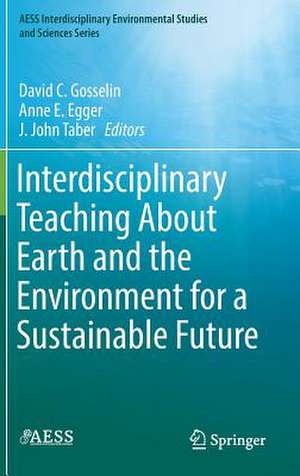Interdisciplinary Teaching About Earth and the Environment for a Sustainable Future: AESS Interdisciplinary Environmental Studies and Sciences Series
Editat de David C. Gosselin, Anne E. Egger, J. John Taberen Limba Engleză Hardback – 24 ian 2019
Interdisciplinary Teaching about the Earth and Environment for a Sustainable Future presents the outcomes of the InTeGrate project, a community effort funded by the National Science Foundation to improve Earth literacy and build a workforce prepared to tackle environmental and resource issues. The InTeGrate community is built around the shared goal of supporting interdisciplinary learning about Earth across the undergraduate curriculum, focusing on the grand challenges facing society and the important role that the geosciences play in addressing these grand challenges. The chapters in this book explicitly illustrate the intimate relationship between geoscience and sustainability that is often opaque to students. The authors of these chapters are faculty members, administrators, program directors, and researchers from institutions across the country who have collectively envisioned, implemented, and evaluated effective change in their classrooms, programs, institutions, andbeyond. This book provides guidance to anyone interested in implementing change—on scales ranging from a single course to an entire program—by infusing sustainability across the curriculum, broadening access to Earth and environmental sciences, and assessing the impacts of those changes.
Preț: 792.81 lei
Preț vechi: 966.85 lei
-18% Nou
Puncte Express: 1189
Preț estimativ în valută:
151.75€ • 164.89$ • 127.55£
151.75€ • 164.89$ • 127.55£
Carte tipărită la comandă
Livrare economică 21 aprilie-05 mai
Preluare comenzi: 021 569.72.76
Specificații
ISBN-13: 9783030032722
ISBN-10: 3030032728
Pagini: 405
Ilustrații: XXIII, 386 p. 72 illus., 63 illus. in color.
Dimensiuni: 155 x 235 mm
Greutate: 0.75 kg
Ediția:1st ed. 2019
Editura: Springer International Publishing
Colecția Springer
Seria AESS Interdisciplinary Environmental Studies and Sciences Series
Locul publicării:Cham, Switzerland
ISBN-10: 3030032728
Pagini: 405
Ilustrații: XXIII, 386 p. 72 illus., 63 illus. in color.
Dimensiuni: 155 x 235 mm
Greutate: 0.75 kg
Ediția:1st ed. 2019
Editura: Springer International Publishing
Colecția Springer
Seria AESS Interdisciplinary Environmental Studies and Sciences Series
Locul publicării:Cham, Switzerland
Cuprins
Part1. Interdisciplinary Teaching about Earth for a Sustainable Future.- Chapter1. Preparing Students to Address Grand Challenges and Wicked Problems: The InTeGrate Approach.- Chapter2. The InTeGrate materials development rubric: A framework and process for developing curricular materials that meet ambitious goals.- Chapter3. Facilitating the development of effective interdisciplinary curricular materials.- Chapter4. Supporting implementation of program-level changes to increase learning about Earth.- Chapter5. Measuring literacy, attitudes, and capacities to solve societal problems.- Part2. Earth and sustainability across the curriculum.- Chapter6. Implementing and assessing InTeGrate Critical Zone Science materials in an undergraduate geoscience program.- Chapter7. Multidisciplinary and Topical in the Science Classroom: Regulating Carbon Emissions to Mitigate Climate Change.- Chapter8. Tackling the Wicked Problem of Global Food Security: Engaging undergraduates through ArcGIS Online.- Chapter9. Using Ecosystem Services to Engage Students in Public Dialogue about Water Resources.- Chapter10. Teaching societal risk and resilience through systems analysis of major storms.- Chapter11. Assessing Hazards, Vulnerability and Risk through an Active Learning-Based Educational Module.- Chapter12. Renewable energy and environmental sustainability.- Part3. Models for change within the higher education system.- Chapter13. Implementing InTeGrate materials in an Upper Division Undergraduate Engineering course.- Chapter14. Modified use of the InTeGrate curriculum in the sustainability general education program at California State University, Chico.- Chapter15. Use of InTeGrate materials to enhance collaboration in the El Paso Higher Education Community.- Chapter16. Creating Opportunities to Teach and Engage with Undergraduates and Faculty at Two-Year Colleges and Minority Serving Institutions.- Chapter17. HBCUs broadening participation in geosciences.
Recenzii
“The book would be useful for others interested in interdisciplinary geoscience course development and assessment. The InTeGrate website can be utilized any instructor interested in using any of the Integrate courses, modules, and assessment materials.” (Richard Smardon, Journal of Environmental Studies and Sciences, Vol. 9, 2019)
Notă biografică
Textul de pe ultima copertă
Interdisciplinary Teaching about the Earth and Environment for a Sustainable Future presents the outcomes of the InTeGrate project, a community effort funded by the National Science Foundation to improve Earth literacy and build a workforce prepared to tackle environmental and resource issues. The InTeGrate community is built around the shared goal of supporting interdisciplinary learning about Earth across the undergraduate curriculum, focusing on the grand challenges facing society and the important role that the geosciences play in addressing these grand challenges. The chapters in this book explicitly illustrate the intimate relationship between geoscience and sustainability that is often opaque to students. The authors of these chapters are faculty members, administrators, program directors, and researchers from institutions across the country who have collectively envisioned, implemented, and evaluated effective change in their classrooms, programs, institutions, andbeyond. This book provides guidance to anyone interested in implementing change—on scales ranging from a single course to an entire program—by infusing sustainability across the curriculum, broadening access to Earth and environmental sciences, and assessing the impacts of those changes.
Caracteristici
The book explicitly links research on learning and the theoretical frameworks of sustainability to improve higher education Provides multiple examples of successful transformation in diverse institutional settings provide models to facilitate change across the higher education system Presents rigorously developed interdisciplinary curricular materials that are classroom-tested and freely available online









